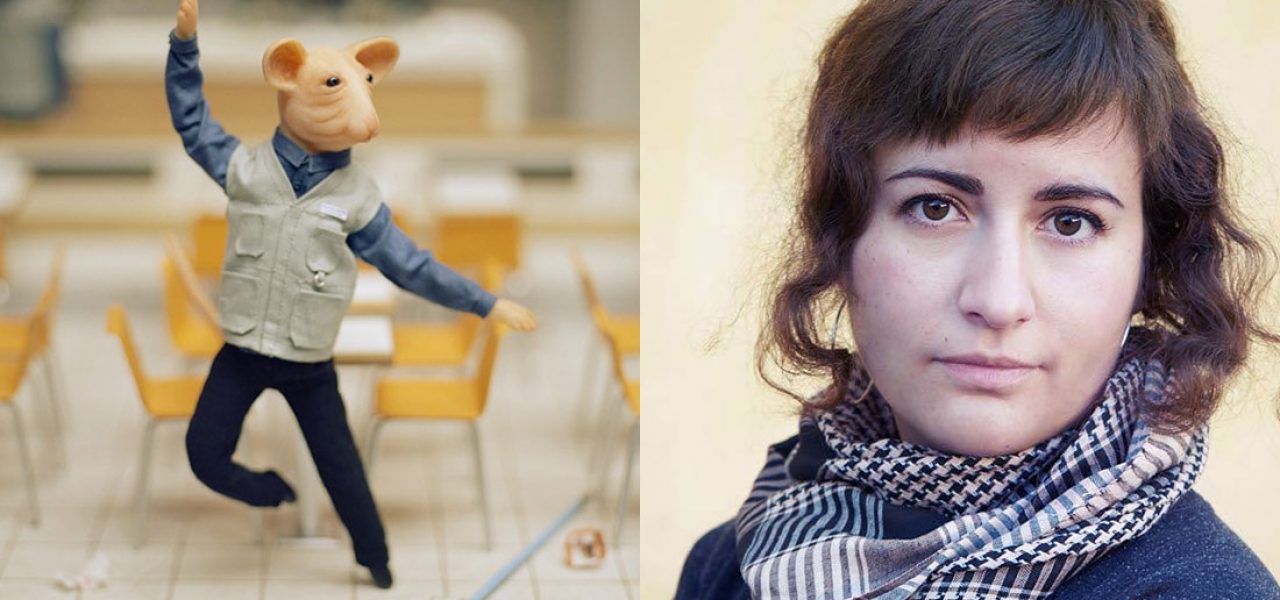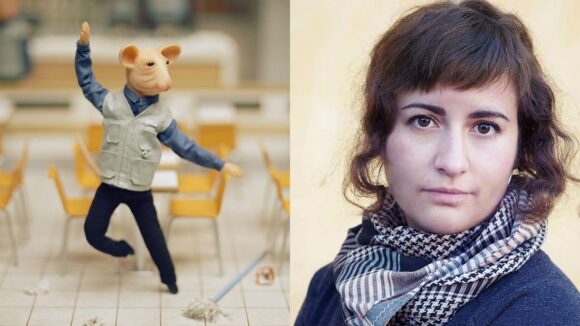

A Chat With ‘The Burden’ Filmmaker Niki Lindroth von Bahr, Whose Films Will Be Screened In Montreal
On Wednesday, April 4, the Cinémathèque québécoise in Montreal will feature a retrospective on the works of Swedish director Niki Lindroth von Bahr, whose most recent stop-motion short The Burden won the Cristal for Best Short Film at Annecy 2017 and dominated the awards at the recent edition of GLAS Animation Festival.
The retrospective will be followed by a discussion between the filmmaker and director Matthew Rankin (The Tesla World Light) and is part of the Cinémathèque’s “Nordic Spring” program, which will continue throughout the month and includes an Ingmar Bergman retrospective, as well as recent features from the Nordic countries. In addition to the screening of her own films, Lindroth von Bahr is also curating her own carte blanche program on Swedish animation.
“I was asked to pick my favorite Swedish animation just from the last one or two years, but I realized that that’s kind of impossible, because we don’t have that many animated films in Sweden. It’s not a very big culture here,” Lindroth von Bahr tells Cartoon Brew. “A lot of animation in Sweden is very focused on children’s culture. There aren’t that many adult animation projects going on.”
Still, the filmmaker says she found the selection process enjoyable, and is excited to get the chance to highlight films by animators that have influenced her career. Among them are Johannes Nyholm, an artist who created the series The Tale of Little Puppetboy, and Andreas Nilsson, who is now known for his major commercial work with the likes of Samsung and Kanye West, but who back in the day inspired Lindroth von Bahr with his animated music video for Swedish duo The Knife’s 2006 song “Like a Pen.”
Lindroth von Bahr’s own work has been turning heads on the festival circuit for some years now, and she’s become known for exploring dark themes with a somewhat ironic twist. Her first film, Tord and Tord, dealt with loneliness and mental illness, while her 2014 Bath House took Anima Brussels by storm with its absurdist melancholy. Her latest short film, The Burden, features a cast of animals who are working dead-end jobs and struggle with the banality of existence. Lindroth von Bahr sees herself in her characters.
“I’ve also worked a lot [of] really, really depressing and pointless jobs to make money, because most of us need to from time to time. As we all know, working with culture and art and film is not a very lucrative place to be, work-wise,” she grumbles, albeit lightheartedly.
More than her previous two films, The Burden highlights the filmmaker’s whimsical side, as evidenced by the fish and monkeys of her world dealing with their existential dread through song and dance. Lindroth von Bahr says she was greatly inspired by the work of Busby Berkeley, a Broadway choreographer who worked on over three dozen Hollywood musicals throughout the ’30s and ’40s.
To realize her vision, Lindroth von Bahr hired a choreographer to plan the dancing scenes for the rats who work in the fast-food restaurant and the monkeys who work in the call center. Lyrics were provided by Swedish author Martin Luuk, and the music was composed by friend Hans Appelqvist, who also did the sound design for her previous two films. Lindroth von Bahr says that the style of music she requested from him, which was eventually recorded by a live orchestra, was a far cry from his usual genre.
“I asked Hans, basically, ‘Can you please do a musical inspired by these old Hollywood musicals like West Side Story or Singing in the Rain?’ And he was like, ‘Yeah, I can try,’” she says, laughing. “I was so impressed. He’s really a genius.”
Despite the film’s highly successful outcome, Lindroth von Bahr admits that she was frustrated with her budget of approximately 75,000 euros, the majority of which was provided by the Swedish Film Institute. Smaller grants were awarded by Film i Väst and the Rooftop Filmmakers Fund.
“It would have been nice to make the dance numbers larger. [Busby Berkeley] always made these dance scenes with 30 people making different patterns in their dancing, and it’s really surreal and crazy,” says the director. “I kind of wanted that for this film, but I couldn’t really do it because we didn’t have the space or the time to make that many puppets.”
Largely, though, Lindroth von Bahr says she refused to compromise her artistic vision. She ended up getting the short end of the stick as a result.
“I basically spent two years working full-time and not getting paid. So that’s my punishment,” she says, still laughing despite her bleak admission. “But I wouldn’t allow myself to release something that I wasn’t 100 percent satisfied with.”
Lindroth von Bahr says that, in the past, she’s been very ambitious with her storyboards. “For my first two films, I was very strict, I did super detailed—almost too detailed—storyboards, and really used them very exactly for the animation,” she says.
For The Burden, however, Lindroth von Bahr was significantly more flexible in the early stages. She planned out a rough storyboard, but needed to be able to adjust as she received new input from the composer and choreographer. Since she had more animators working with her than on previous projects, she says she was also able to take a step back from the production process to be more creative, though she continued to do hands-on animation.
“When you start animating, you drown in so much technical stuff, so you’re not really [able] to make new creative decisions in the middle of animating,” she explains. “For this film, I could actually have the role of just being a director, so it became a little bit easier to keep that creativity, and not just lose myself in the technical issues, which were many, of course.”
Fresh off the heels of a long festival run for The Burden, Lindroth von Bahr already has some ideas for her next animated project, namely a supernatural Lynchian thriller about the financial world — but she’s not in any hurry to get started. Her interest in other aspects of the art world has already drawn her to some costume design projects, for example a collaboration with Nicklas Nilsson on David Bowie’s 2015 music video for “Blackstar.” Though she thinks she will return to animation, she wonders if she might explore some different avenues for now.
“I like to be quite free in my artistic ways. It’s really nice to… have an idea and have a result in two weeks instead of two years,” she says, laughing again. “I think it’s healthy for me to combine animation with other creative expressions.”
For more information about the Niki Lindroth von Bahr retrospective in Montreal on April 4, visit the Cinémathèque québécoise website.

.png)